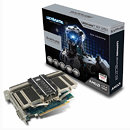- Joined
- Dec 6, 2011
- Messages
- 4,784 (0.99/day)
- Location
- Still on the East Side
SAPPHIRE Technology has just introduced a passively cooled card in its new R7 series. The SAPPHIRE R7 250 ULTIMATE is the first totally silent card to embody all the features of this new generation of products based on the highly successful graphics GCN (Graphics Core Next) architecture from AMD.
The SAPPHIRE R7 250 ULTIMATE is the first card in this generation to use a passive heatpipe and heatsink cooler with no fan to deliver totally silent cooling, and increased reliability as it has no mechanical moving parts. It shares all the features of the R7 series and the highly acclaimed GCN graphics processing architecture making it ideal for HTPCs and any general purpose PC where operational noise needs to be kept to a minimum. Casual and online gamers will find its silent operation attractive, as the GCN architecture supports gaming at 1080p with moderate settings.

The SAPPHIRE R7 250 ULTIMATE delivers excellent performance with core clocks of 800 MHz and 1 GB of DDR5 memory clocked at 1125 MHz (4.5 GHz effective). It is believed to be the fastest passively cooled 128-bit graphics card on the market.
Displayport 1.2 and HDMI 1.4a outputs on this card support resolutions of 4096 x 2160 - in other words Quad HD, or the latest 4K displays. AMD 3D technology supports the latest Stereoscopic content over HDMI at 60 Hz per eye, 120 Hz total. The Dual-Link DVI-I output supports DVI monitors with resolutions up to 2560 x 1600 and provides analogue support for legacy VGA monitors.
Working with multiple monitors is becoming increasingly popular, and the SAPPHIRE R7 series supports this with AMD Eyefinity, now in its second generation. The SAPPHIRE R7 250 ULTIMATE supports three monitors in AMD Eyefinity. In addition, the SAPPHIRE R7 series cards can simultaneously output multiple, independent audio streams allowing the correct audio content to be associated with different applications on different screens.
The R7 series is the fourth generation of DirectX 11 compatible solutions from the graphics division of AMD - formerly ATI. The new SAPPHIRE R7 series supports DirectX 11.1 and the Windows 8 operating system as well as delivering all the features of DirectX 11 such as DirectCompute11 and multi-threaded communications with the CPU.
Communication with the host PC is optimised with the implementation of the latest high speed PCI-Express Gen3.0 interface, and multiple cards can be used to further enhance performance in CrossFireX mode on a suitably specified mainboard.
APP Acceleration is the name given to the enhanced performance of a wide range of applications using the stream processing capabilities and specific hardware features of the graphics architecture. The GCN architecture of the R7 series has been optimised for this type of task. Typical applications include Video encoding and decoding, compression and multiplexing for media distribution, gaming or video conferencing. APP acceleration can also enhance everyday tasks such as Internet browsing, Office applications and file compression with supported software suites.
The SAPPHIRE R7 250 ULTIMATE is available now from SAPPHIRE's global etailers and retailers.
View at TechPowerUp Main Site
The SAPPHIRE R7 250 ULTIMATE is the first card in this generation to use a passive heatpipe and heatsink cooler with no fan to deliver totally silent cooling, and increased reliability as it has no mechanical moving parts. It shares all the features of the R7 series and the highly acclaimed GCN graphics processing architecture making it ideal for HTPCs and any general purpose PC where operational noise needs to be kept to a minimum. Casual and online gamers will find its silent operation attractive, as the GCN architecture supports gaming at 1080p with moderate settings.

The SAPPHIRE R7 250 ULTIMATE delivers excellent performance with core clocks of 800 MHz and 1 GB of DDR5 memory clocked at 1125 MHz (4.5 GHz effective). It is believed to be the fastest passively cooled 128-bit graphics card on the market.
Displayport 1.2 and HDMI 1.4a outputs on this card support resolutions of 4096 x 2160 - in other words Quad HD, or the latest 4K displays. AMD 3D technology supports the latest Stereoscopic content over HDMI at 60 Hz per eye, 120 Hz total. The Dual-Link DVI-I output supports DVI monitors with resolutions up to 2560 x 1600 and provides analogue support for legacy VGA monitors.
Working with multiple monitors is becoming increasingly popular, and the SAPPHIRE R7 series supports this with AMD Eyefinity, now in its second generation. The SAPPHIRE R7 250 ULTIMATE supports three monitors in AMD Eyefinity. In addition, the SAPPHIRE R7 series cards can simultaneously output multiple, independent audio streams allowing the correct audio content to be associated with different applications on different screens.
The R7 series is the fourth generation of DirectX 11 compatible solutions from the graphics division of AMD - formerly ATI. The new SAPPHIRE R7 series supports DirectX 11.1 and the Windows 8 operating system as well as delivering all the features of DirectX 11 such as DirectCompute11 and multi-threaded communications with the CPU.
Communication with the host PC is optimised with the implementation of the latest high speed PCI-Express Gen3.0 interface, and multiple cards can be used to further enhance performance in CrossFireX mode on a suitably specified mainboard.
APP Acceleration is the name given to the enhanced performance of a wide range of applications using the stream processing capabilities and specific hardware features of the graphics architecture. The GCN architecture of the R7 series has been optimised for this type of task. Typical applications include Video encoding and decoding, compression and multiplexing for media distribution, gaming or video conferencing. APP acceleration can also enhance everyday tasks such as Internet browsing, Office applications and file compression with supported software suites.
The SAPPHIRE R7 250 ULTIMATE is available now from SAPPHIRE's global etailers and retailers.
View at TechPowerUp Main Site






